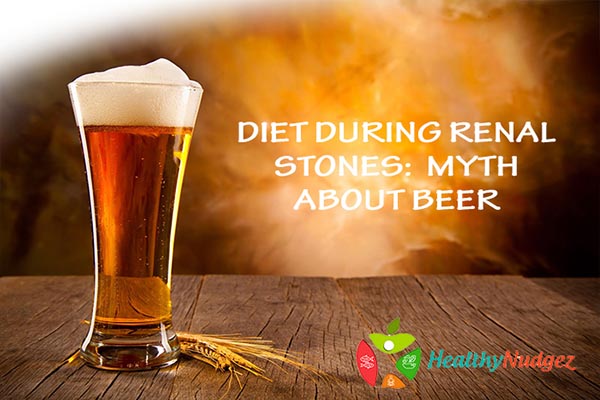Diet During Renal Stones: Myth About Beer
Renal stones can be found in kidneys, ureter, urinary bladder, or urethra. These are formed when the urine becomes too concentrated with certain components which results in crystallisation of that components. Crystals in urine stick together to form hard mass of stone referred to as crystals.
Renal stones are more prevalent in males between age of 30-45 years but now- a-days due to sedentary lifestyle and lack of healthy eating habits, it can occur in any age group.
Small sized, tiny stones sometimes passe out of body via urine without causing any symptoms. However, if the size of stone increases more than 5mm then it can cause obstruction in urinary passage.
The majority of urinary calculi (renal stone) are made up of calcium oxalate, calcium phosphate, uric acid, or magnesium ammonium phosphate(struvite).
Most common type in India is calcium oxalate. Reoccurrence of kidney stones is common.
The symptoms that accompany renal stone formation and obstruction caused by them are:
- Severe pain in groin or sides
- Blood in urine
- Nausea and vomiting
- Pus cells in urine
- Reduced amount of urine
- Burning sensation while urination
- Fever if there is infection
- Persistent urge to urinate
There are many reasons behind renal stones but most important is dehydration or LACK OF INTAKE OF FLUIDS on a daily basis.
Other causes may be:
*Overconsumption of foods rich in oxalates, (like spinach, wheat bran, mustard leaves, tomato sauce, peanuts, soybean, cocoa, coffee, cashewnuts) increases the risk of reoccurrence of calcium oxalate stones.
* Excess salt intake is also a main reason behind kidney stones. Table salt (sodium chloride) is rich source of sodium and is major contributing factor in formation of kidney stones.
A high sodium intake increases the risk of stone formation by increasing calcium levels and decreasing citrate (a stone inhibitor) levels in urine. These altered levels make it easier for stones to develop.
* Higher intake of animal food like meat, fish and poultry increases the risk of renal calculi as animal protein increases the acid load of urine.
* Deficiency of vitamin B6 also contributes to increase in risk of renal stones due to increased production of oxalic acid in body.
* Obesity, hypertension and sedentary life style.
Studies have shown that the dietary restriction of calcium reduce its urinary excretion but severe dietary calcium restriction can cause hyperoxaluria (more oxalate in urine) and a progress loss of BONE MINERAL COMPONENT.
DO’S AND DON’T’S In renal stones:
- Avoid Animal protein: Restriction of animal protein like red meat, fish, sausages, beef , poultry products lessens the risk of renal stones.
- Avoid sugar: Less intake of bakery products like cake, pastries , breads and beverages like soft drink,iced tea, canned juices help in preventing reoccurrence of stones.
- Plenty of fluids: Adequate amount of fluids like coconut water , barley water, lemon water, water is recommended as it ensures the passage of minimum 2 litres of urine everyday.
- Cranberry juice also helps to prevent urinary infection but intake should be limited.
- ALKALINE ASH diet: If stones of calcium oxalate, uric acid or cysteine type occurs, the diet should give alkaline ash. This helps in maintaining the pH of urine .Alkaline Ash diet includes mostly all vegetables. Among fruits lemon, lime, watermelon, grape fruit, tomato, Avocado, etc.
- SALT RESTRICTION: Daily salt intake should be reduced (less than 4 gms per day)in order to prevent reformation of kidney stones. Foods like canned food, salad dressings, biscuits, sausages, beverages should be avoided as these are high in sodium content. Also foods containing baking powder, baking soda, monosodium glutamate (ajinomoto) should be restricted.
- BEER INTAKE is NOT ADVISABLE.
BEER IS A MYTH: Beer has diuretic effect, it expels out more fluid in form of urine from body which results in dehydration. Urine gets concentrated and become acidic which contribute to predisposition to renal calculi. Beer is rich in oxalate and uric acid which is not good for renal stone.
BEER consumption provokes Gastrointestinal reflux and causes heart burn.
Conclusion: For Calcium oxalate, uric acid stones the urine must be alkalinised by taking fruits and vegetables, less animal protein and plenty of liquids. Studies have shown that the low sodium, low animal protein, normal calcium diet led to lower levels of calcium and oxalate in the urine as compared to a low calcium diet . This helps to prevent reoccurrence of kidney stones.
Know More – Nutritionist in Delhi

